Moonpreneur
Update: This article was last updated on 16th November 2023 to reflect the accuracy and up-to-date information on the page.
Oh, the classic battle in the corporate world!
MNC vs Startup, which is a better workplace and which is the one with the potential of taking a person’s career to new heights. Interestingly both of these types of organizations offer unique experiences and opportunities but are still vastly different in terms of culture, work environment, growth potential, and more.
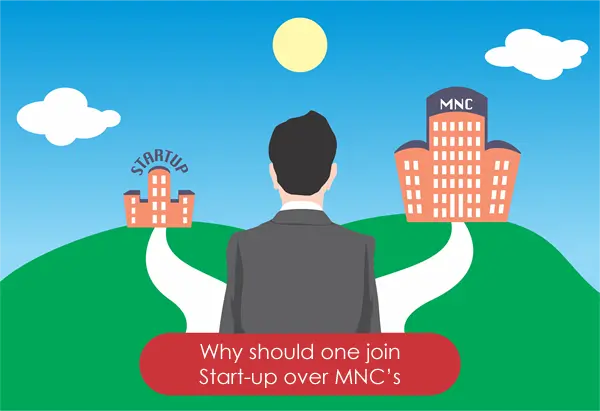
The data represented in the below graph speaks for itself. MNC or a Multinational Company has some edge over startups and thus has resulted in 58% of students preferring it over the startup environment!! Although, this hasn’t affected the growth, with the world counting nearly 26,000 startups in the fintech industry alone in 2021, as per Statista.

We decided to analyze how your career can transform by selecting the right workplace for yourself and what pointers you should consider before deciding upon a suitable workplace. In this blog, we will explore seven key differences between working for an MNC and a startup.
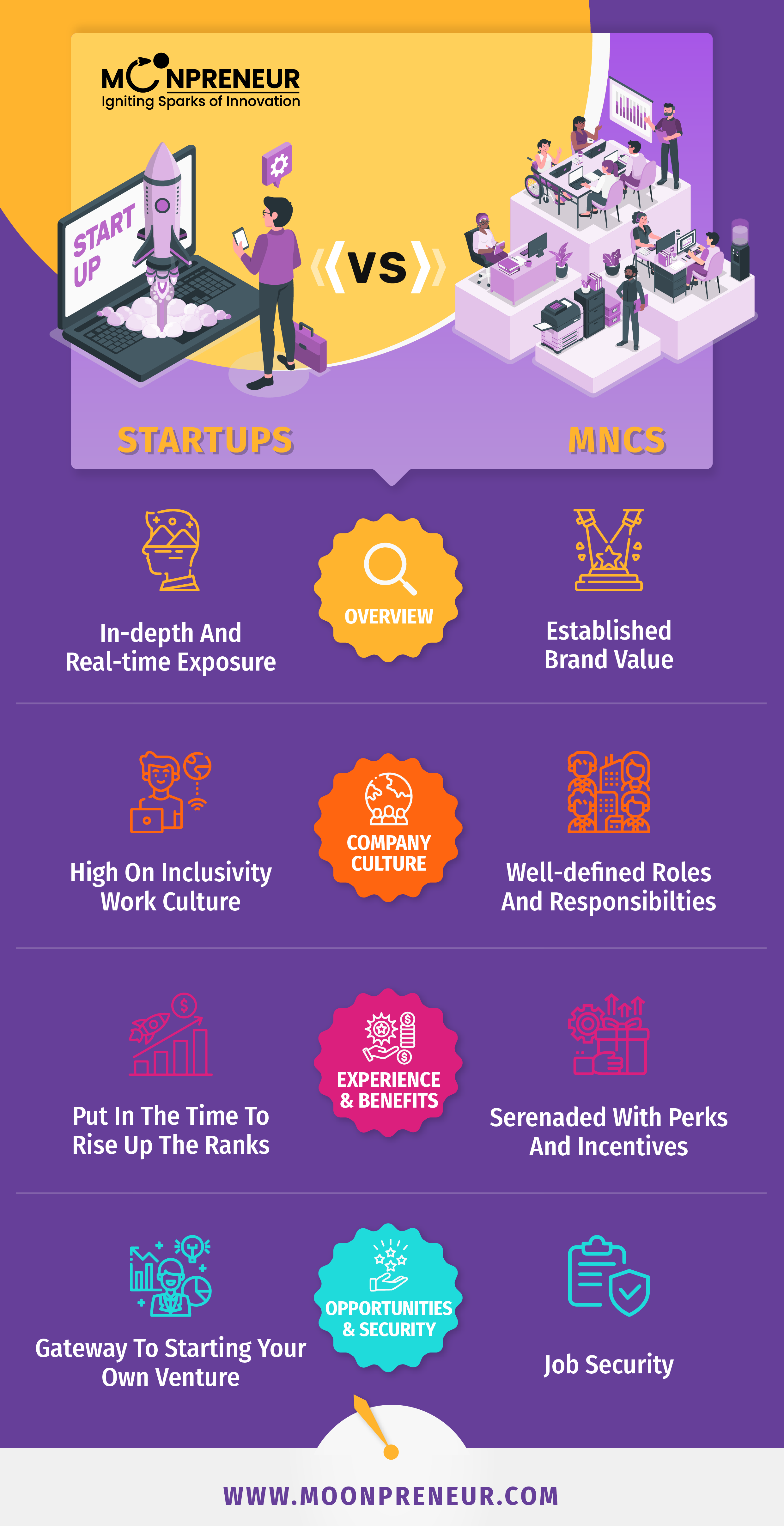
1. Company Size and Structure
One of the most apparent differences between MNCs and startups is their size and structure. Some of the biggest MNCs are situated in the US, and they are huge if numbers, as shown in the graph below, are considered. Companies such as Amazon and Apple are usually large and established companies with well-defined hierarchical structures. On the other hand, startups are smaller and more agile, with a relatively flat organizational structure.
Recommended Reading: Child Entrepreneurship: Top 7 Tips to Support Your Kid
| MNC | Startup |
|---|---|
| In MNCs, there is a clear division of labor and well-defined job roles. Employees work in a structured environment and have clear responsibilities with specific KPIs to achieve. | Startups operate in a more flexible and dynamic work environment, focusing on collaboration and cross-functional roles. Startups offer the opportunity to wear multiple hats and work on projects outside of your area of expertise, allowing employees to develop a broader skill set. |
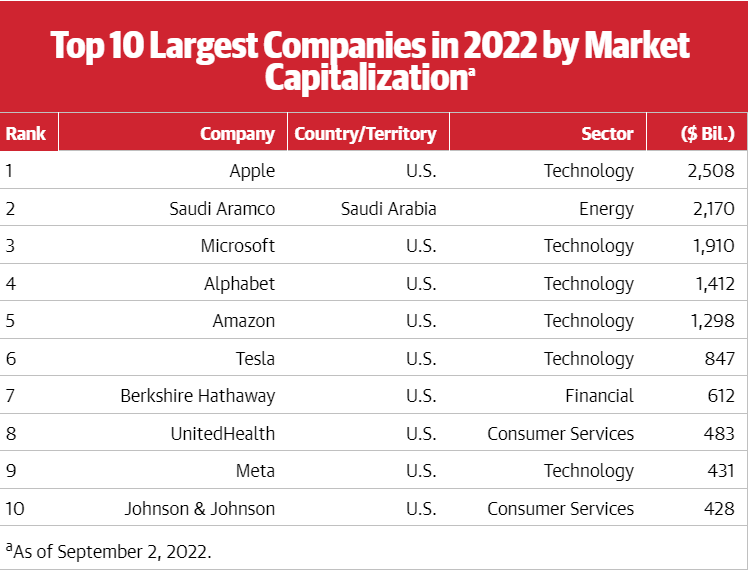
2. Work Culture
Another key difference between MNCs and startups is their culture and work environment.
| MNC | Startup |
|---|---|
| MNCs are known for their formal and corporate culture, with well-established processes, policies, and procedures. | In contrast, startups have a more relaxed and informal culture, focusing on innovation, experimentation, and creativity. Startups also often have more open communication channels, with founders and executives being more approachable and accessible to employees. MNCs, on the other hand, are more formal in their communication and have a more rigid work environment. |
Recommended Reading: Identifying the Suitable Employee for Your Startup
3. Job Security and Stability
As per Randstad’s report, nearly 52% of the workforce is willing to forfeit over 10% of their salary to gain job security! Job security and stability are some of the leading points a person weighs on.
| MNC | Startup |
|---|---|
| MNCs are commonly considered to be more stable and secure, with well-established business models and steady revenue streams. Over the years, MNCs have built a larger customer base, which means that they are less vulnerable to market fluctuations. | Startups are generally considered to be less stable and riskier. Startups are often funded by venture capital firms, meaning they have to demonstrate rapid growth and profitability to attract further investment. |
As a result, startups can be more vulnerable to market fluctuations and economic downturns. Startups also have a higher risk of failure, and you, as an employee, are more likely to be laid off if the company fails to perform well.
4. Career Growth and Learning Opportunities
Unique opportunities for career growth and learning are offered both by MNCs and startups alike.
| MNC | Startup |
|---|---|
| Although MNCs often have well-defined career paths and structured training programs that allow employees to develop their skills and progress within the organization. Working in an MNC also allows you to work on large-scale projects and initiatives, which can be a valuable learning experience. | Startups, on the other hand, offer more opportunities to learn and develop skills outside of your job role. In a startup, employees are often required to wear multiple hats and work on projects outside their expertise. Startups also offer the opportunity to work in a fast-paced and dynamic environment, which can help employees develop a sense of urgency and adaptability. |
This can provide valuable learning opportunities and help employees develop a broader skill set.
5. Compensation and Benefits
What drives an employee to be efficient at the workplace? If one asks the employees, compensation, and benefits would probably be one of the top picks!!
| MNC | Startup |
|---|---|
| MNCs often offer more competitive salaries and benefits, such as healthcare, retirement plans, and paid time off, to their employees, and also often offer bonuses and profit-sharing plans, which can be a valuable source of additional income for the employees. | Startups, on the other hand, offer more opportunities to learn and develop skills outside of your job role. In a startup, employees are often required to wear multiple hats and work on projects outside their expertise. Startups also offer the opportunity to work in a fast-paced and dynamic environment, which can help employees develop a sense of urgency and adaptability. |
6. Work-Life Balance
Whether it’s a startup or an MNC, work-life balance is an important consideration for many employees; nearly 77% of employees have claimed that they have experienced burnout at least once in their jobs, and around 72% believe that work-life balance is a very important factor when it comes to choosing a job, while 57% job seekers state that a firm having a poor work-life balance is a strict no for them!
And here is the striking difference between MNCs and startups.
| MNC | Startup |
|---|---|
| MNCs often have more structured work hours. | In contrast, the fast-paced and dynamic nature of startups can lead to longer work hours and a higher stress level for some employees. |
7. Innovation and Creativity
Startups lead innovation in a country; the key advantage of working for a startup is the opportunity to work in an innovative, dynamic, and exciting work environment. Startups are often focused on developing new products and services, which requires a high degree of creativity and innovation. In contrast, MNCs may focus more on maintaining the status quo and optimizing existing products and services.
There are close to 71,153 startups in the United States alone, with India coming in at second place with 13,125 startups which is fuelling its developing economy!! As the below graph by Statista shows, the number of startups that are working on more innovative areas of technology, thus working in a startup can be a great opportunity for individuals who enjoy working on cutting-edge technology and exploring new ideas.
| MNC | Startup |
|---|---|
| May focus on maintaining the status quo | Startups lead innovation in a country |
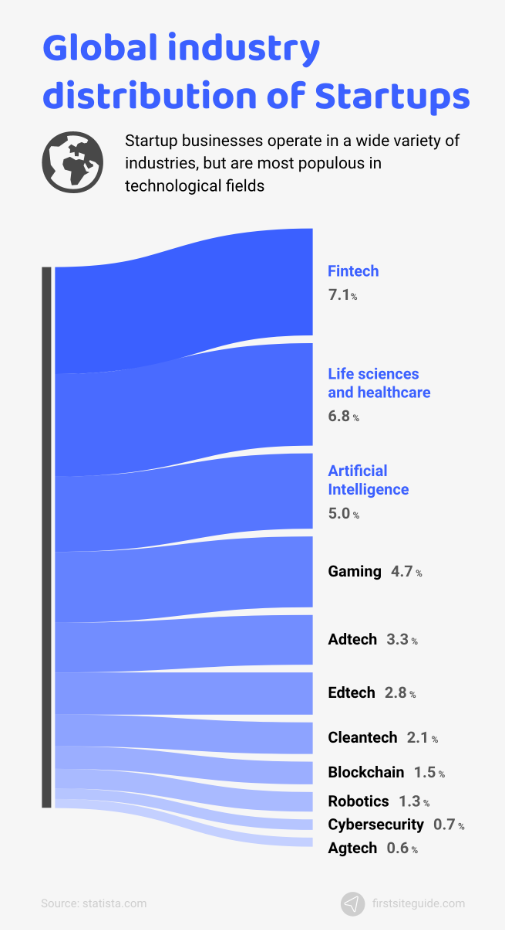
Pros and Cons of MNC’s
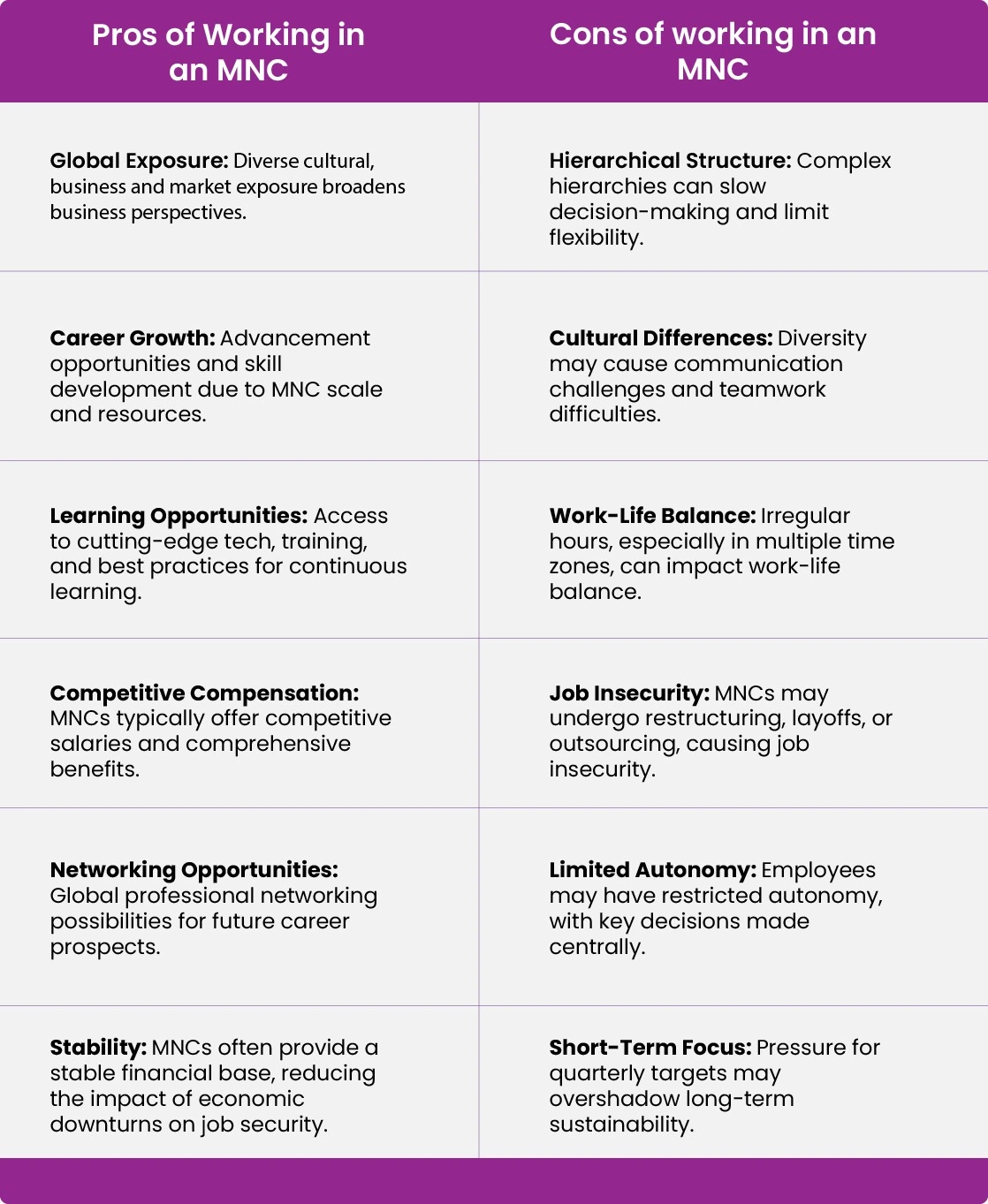
Pros and Cons of Startups
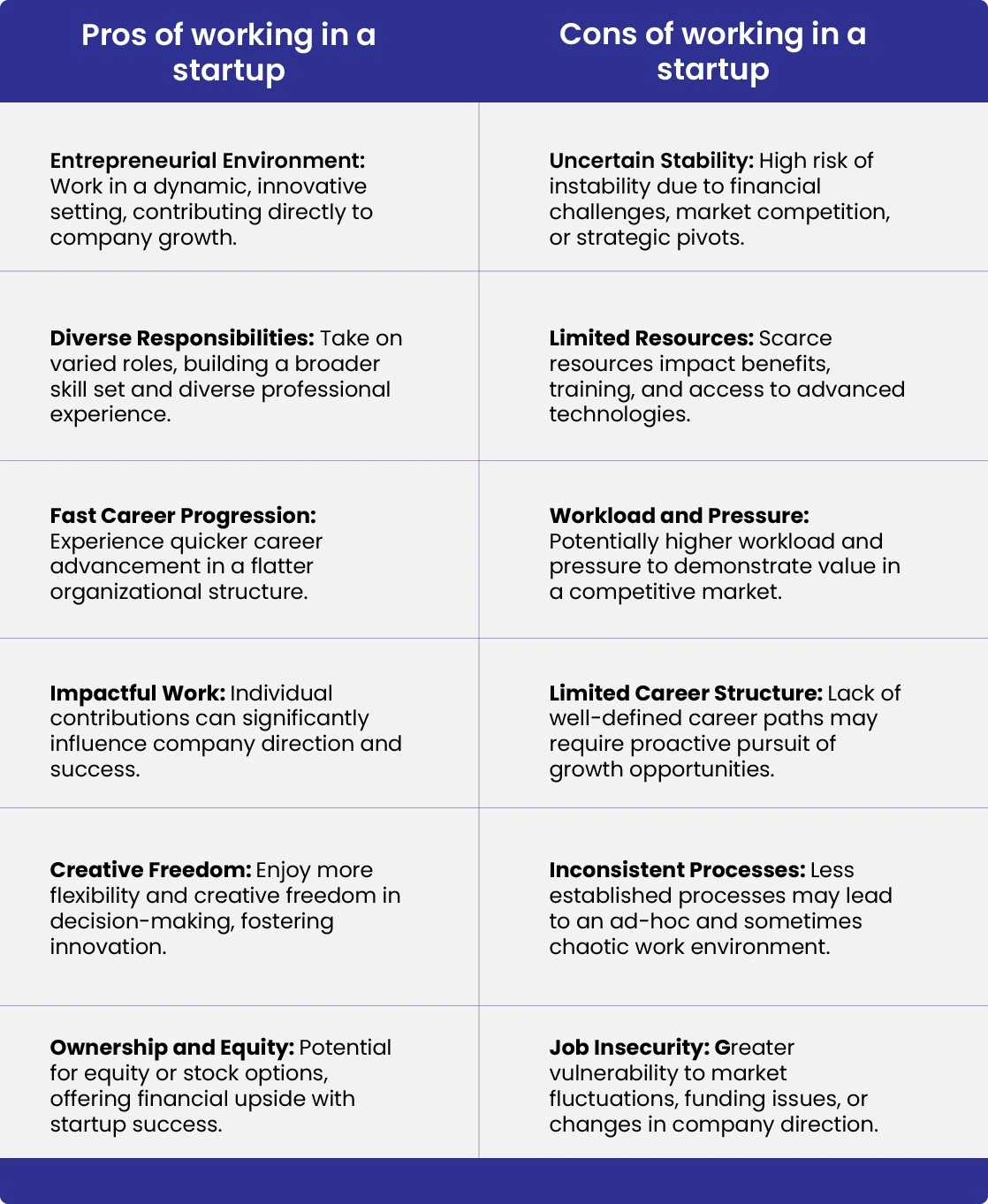
Recommended Reading: Identifying the Suitable Employee for Your Startup
Conclusion
There are significant differences when choosing between an MNC and a startup. The perks of an MNC offer a more lucrative opportunity for a person, but at the same time, startups offer a fast-paced learning environment that may be valuable for several individuals. The choice is tough!! The choice between working for an MNC or a startup will only depend on an individual’s personal goals and preferences in life.
Moonpreneur is on a mission to disrupt traditional education and future-proof the next generation with holistic learning solutions. Its Innovator Program is building tomorrow’s workforce by training students in AI/ML, Robotics, Coding, IoT, and Apps, enabling entrepreneurship through experiential learning.
| MNC | Startup |
|---|---|
| MNCs often have more structured work hours. | In contrast, the fast-paced and dynamic nature of startups can lead to longer work hours and a higher stress level for some employees. |


















You have missed risk tolerance factor which is needed to be considered for choosing between an MNC and a startup
Which is better for me, working for an MNC or a startup?
The best place to work for you depends on your individual preferences and goals. If you are looking for job security and stability, an MNC may be a better choice. If you are looking for an exciting and challenging environment, a startup may be a better fit.
Ultimately, the best way to decide which type of company is right for you is to do your research and talk to people who work in both types of environments.